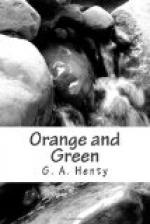One column, headed by sixty chosen men in complete armour, was to cross the bridge and throw a platform over the arch; another to cross by the ford: the third by a pontoon bridge. When the church bell tolled six, the three columns advanced simultaneously, and, before the Irish were thoroughly awake, the leading battalions had forded the river, the platform was in its place, and the troops pouring into the town.
A few guns were hastily discharged, and then the men of the three Irish regiments in the town fled in haste, to avoid capture by the columns pouring across the river by the ford and pontoon bridge. Many, indeed, were captured whilst asleep. Saint Ruth, roused from sleep by the sound of cannon, ordered the troops to arms, but it was too late. The town, or rather its ruins, were in the possession of the British, and the brilliant success, which had been won by the valour and determination of the Irish troops, was forfeited by the carelessness, folly, and self-confidence of the French general.
Had he listened to the advice of the Irish officers, the attempt, like those which had preceded it, must have failed, and in that case there was nothing remained to Ginckle but a precipitous retreat to Dublin, with the loss of the whole of the advantages gained in the previous campaign, and the necessity of bringing the war to an end by the concession of the rights and privileges of the Irish Catholics and landowners. The whole course of history was changed by the folly of one man. Ginckle had taken Athlone, but it was at a vast cost of life, and he was more than ever impressed with the magnitude of the task of subduing Ireland, so long as the people were driven to desperation by the threatened confiscation of all their lands, and by the persecution of their religion. King William, too, was more anxious than ever for the termination of hostilities, and, on the very day that the news of the fall of Athlone reached him, he issued a proclamation offering protection, security of all possessions, and continuance in any offices which they held under James, to all who would lay down their arms in three weeks’ time.
The issue of such a proclamation as this, a year before, would have satisfied the Irish and put a stop to the war; but it was now too late. The promises made had been broken, over and over again, and the Irish had but too much reason to fear that, when all opposition ceased, the council and their train of greedy adherents would again obtain the ascendency, and would continue their work of spoliation and robbery.
Moreover, the Irish army did not feel itself in any way beaten. It was not its fault that the second siege of Athlone had not terminated as the former siege and that of Limerick had done, and that Ginckle’s army was not hurrying back, defeated and disorganized, to Dublin. They felt that, at the battle of the Boyne, they had suffered no defeat, although, in accordance with the general plan, they had fallen back, and they eagerly desired to fight one battle to prove that, in the open field, they were more than a match for the mercenaries of King William.




